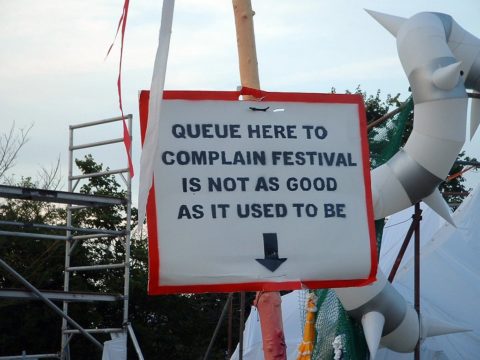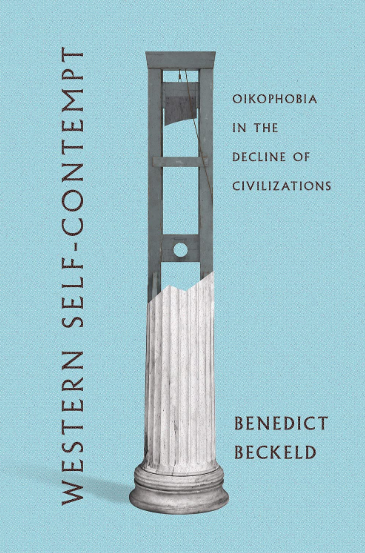Most of what we consider public life in modern societies is public reactions to things done by the powerful. The New York Times makes up a new hoax and the week is spent on the hoax. The usual suspects swear by the obvious lies and normal people spend days picking apart the lies. Occasionally, we get the reverse where some uncomfortable truth gets loose and the usual suspect go bananas trying to “debunk” it while normal people cling to it as blessed relief.
This is the news cycle in a nutshell. There is very little news. It has been at least a generation since the major news outlets in America have done reporting. Most of it is just stenography. The “journalist” copies what a government spokesbot has sent to them and dresses it up with some commentary. Then there are the narratives that are designed to give the public a way to repeat the official truth that sounds convincing to them and their acquaintances.
The source of this is the “new journalism” that emerged in the 1960’s. The late British reporter Chris Munnion chronicled this in his book Banana Sunday. He spent most of his life covering Africa for the Telegraph. In the 1960’s he noticed Americans showing up with pre-written narratives. They would seek out quotes and pictures to fill out the story they had prepared for the trip. Even if the facts contradicted the narrative, they stuck with the narrative because that was the new journalism.
Narrative journalism is just accepted these days. The “news” has always been a form of passive-aggressive political activism so its evolution into story telling on behalf of powerful interests seems natural. When you think of the New York Times, Washington Post and Wall Street Journal as propaganda arms of their respective clients in the managerial elite, it all makes sense. Instead of the Ministry of Truth we have the mainstream media “speaking truth to power”.
That last bit gets mocked by normal people on this side of the great divide because they have woken up to the reality of this age. As if often the case, however, there is a kernel of truth locked in this media fabrication. The people inside these disinformation operations genuinely fear the public. When they say “speak truth to power” they mean broadcast their truth to you in the hopes that you will buy it. Modern mass media is mostly a defensive weapon of the elites.
The Z Man, “The Lying Liars”, The Z Blog, 2022-04-20.
July 23, 2022
QotD: “The New Journalism” and “narrative journalism”
June 28, 2022
Pierre Poilievre … not the Canadian Trump?
Allan Stratton points out to sheltered central Canadian urban voters that populism has a long history in Canadian politics, and didn’t need to be imported from the US:

Conservative MP Pierre Poilievre at a Manning Centre event, 1 March 2014.
Manning Centre photo via Wikimedia Commons.
Conservative leadership candidate Pierre Poilievre is oft accused of importing divisive American right-wing populism to our politics. His endorsement of the trucker protest against vaccine mandates — though not the legal violations of its organizers — has been portrayed as a play for Christian nationalists, racists and fascists. Likewise, his attacks on Davos and the World Economic Forum are said to welcome Trumpian conspiracy theorists, anti-Semites and Great Replacement nativists.
Common wisdom suggests that this strategy may win Poilievre the Conservative party leadership, but will render his party toxic to respectable, mainstream Canadian voters.
There’s a lot of smoke and at least some fire to this critique: The People’s Party of Canada will find it hard to tag Poilievre as a centrist squish.
But thanks to our constitution, the Supreme Court and our general political culture, all more liberal than their American counterparts, social conservative attacks on abortion and LGBT rights seem off the table.
Further, far from a Trumpian nativist, Poilievre is in favour of immigration and wants to cut the red tape that blocks immigrants from employment in their fields, something the current federal government has failed to accomplish into its third mandate.
My fear, as someone who shares many concerns about the prospect of a Poilievre government, is that commentators are misreading the broad appeal of his populism, leading Liberals to unwarranted overconfidence.
Sure, Poilievre’s strategy shares some Trumpian elements, but it’s equally rooted in a progressive Canadian tradition that dates back to the early 19th century and was prominent in the last half of the 20th.
If the Liberals don’t course correct, they may discover that while they are attacking Poilievre as a far-right extremist, he is eating their traditional liberal, working-class lunch.
In broad strokes, I imagine Poilievre channelling Louis-Joseph Papineau and William Lyon Mackenzie during the Rebellions of 1837-38. Instead of the Château Clique and the Family Compact, I see him fighting the Laurentian Consensus, another powerful, unelected group, this time composed of academics, bureaucrats, media apparatchiks and Central Canada think-tankers who dominate our culture and financial establishment — and who arrogate to themselves the right to determine Canadian values and the ways in which we are allowed to describe and think about ourselves as a nation.
For those of us who grew up on the left under Mike Pearson, Tommy Douglas, Pierre Trudeau and David Lewis, it is hard to stomach the recent illiberal turn in elite liberal discourse. It once assumed the importance of free speech, understanding that censorship has always been used by the powerful to suppress the powerless. Yet today, in academia and the arts, free speech has been recast as “hate speech”, and our Liberal government is passing C-11, which seeks to regulate what we read and how we express ourselves online.
June 24, 2022
What happens when the proles stop listening to elite Chicken Littles?
Chris Bray suggests that we should call it “class formation psychosis” instead of “mass”, because it’s the kakistocrats who are doing everything they can to induce “the masses” to feel the fear and obey:
… here’s a picture of a recent panel discussion among public health experts in Los Angeles County, which I wrote about here:
So the normals are just living their lives, and appearing to enjoy it, while the status-projecting elite are engaged in an effort to signal fear and control.
I encourage you to read [Mattias Desmet’s new book] The Psychology of Totalitarianism, especially as an account from an early adopter of the view that our pandemic hysteria has been irrational. But I’m surprised to find myself not buying the argument. Desmet gets the dynamic, but misses the subject: He sees what’s happening, but not who’s doing it. The book is about “the masses”, as in this passage from Chapter 6:
We have to add one more important characteristic to the problematic psychological properties of mass formation: radical intolerance of other opinions and a strong tendency toward authoritarianism. To the masses, dissident voices appear 1) antisocial and devoid of solidarity, because they refuse to participate in the solidarity that the mass formation creates; 2) completely unfounded, as critical arguments are not assigned any cognitive or emotional weight within the narrow circle of attention of the masses; 3) extremely aversive because they threaten to break the intoxication, and in this way confront the masses again with the negative situation that preceded the mass formation (lack of social bond and meaning, indefinable fear and unease); 4) extremely frustrating because they threaten to remove the venting of latent aggression.
This radical intolerance ensures that the masses are convinced of their superior ethical and moral intentions and of the reprehensibility of everything and everyone who resists them: Whoever does not participate is a traitor of the collective.
As someone who spent every moment of the pandemic traveling all over the place, family camping our way through a dozen states and visiting national parks and other tourist-centered destinations, I’ve never met the masses who were consumed with this fearful aggression. In South Dakota in the summer of 2020, I was sitting next to my tent in a state park when some dads on another campsite saw my license plate, then marched over and said that holy shit, man, did you really drive all the way here from California? I hadn’t seen a mask in days, and no one maintained six feet of social distance. As I experienced all over the state, we shook hands and talked. A few days before, at a state park in eastern Wyoming, the couple in the neighboring campsite walked over and offered us dinner, then got trashed on Bud Light — which I didn’t know was possible, on the grounds of “making love in a canoe” — while they hung out by our campfire.
But where we found intolerance and enforced fearfulness was in space controlled by government, as when we got in line outside the Jenny Lake store and quickly drew the attention of the, I am not making this up, line monitor. Masks! Masks! Masks! she helpfully explained, pointing at her masked face to show us what a mask was. Maskless people swarmed around us on all sides, a fact I mentioned to her. “But they’re not in line,” she explained, finding the explanation complete.
Our mass formation psychosis didn’t form in the masses; it formed in policy, and as a social performance among people who wish to be perceived as cultural elites, sniffing at the trash who don’t believe in science. Professors and politicians were highly mask-compliant, and wanted you to know it. My impression is that a quarter to a third of the population locked arms with them and fought proudly for their fear performance, while another third-plus went along to get along, and the balance — especially outside the Blue Zones — just completely ignored the whole mess.
June 21, 2022
“Maybe black people generally prefer black music because it’s far superior to the standard ‘landfill indie’ that ‘Glasto’ is mired in?”
At Spiked, Julie Burchill wonders what happened to Lenny Henry:

“Sign of the times @ Glastonbury Festival” by timparkinson is licensed under CC BY 2.0 .
Spare a thought for Sir Lenworth George Henry, Commander of the Order of the British Empire and knight of the realm. He works without interruption or unemployment at a job he loves (and in his spare time makes television commercials for Premier Inn hotels – megabucks payday ahoy!) and has done so from the age of 16. He is now 63 and, unusually, is becoming more attractive as he ages. He has sailed a trimaran from Plymouth to Antigua, performed on a record alongside Kate Bush and Prince, and escaped from marriage to Dawn French. Whereas some comedians become sad shadows of themselves – capering clowns who are laughed at, not with – in middle age he became a serious actor. His radio documentary, Lenny and Will, sent him “in search of the magic of Shakespeare”, whose plays he has since performed in to great acclaim. Not only is he very rich, he has also helped raise millions of pounds for charity as co-founder of Comic Relief.
But despite all of this wonderful success, Henry has in recent years taken to griping about things which really aren’t worth bothering about. Sir Len, where did it all go wrong? Well, I’d wager that it went wrong when Henry realised that if he identified as happy people might start thinking that he chose showbiz as a way to show off and get handsomely rewarded for it. And where would that leave him in the Victimhood Olympics? Nowhere near the podium.
His latest gripe is about Glastonbury. “It’s interesting to watch Glastonbury and look at the audience and not see any black people there. I’m always surprised by the lack of black and brown faces at festivals. I think, ‘Wow, that’s still very much a dominant culture thing'”, he told the Radio Times this week.
Here’s a thought. Maybe black people generally prefer black music because it’s far superior to the standard “landfill indie” that “Glasto” is mired in? And maybe they’re keener on personal hygiene than a bunch of scruffy, middle-class students roughing it on their gap year before going home to a cushy billet arranged by a friend of their father? You won’t find many white working-class people at festivals, either, for the same reasons.
I speak from personal experience. As a teenage reporter at the New Musical Express I got sent to a festival – Reading – as punishment for one of my many juvenile misdemeanours. The moment my stilettos sunk into the mud, I turned back to the station, thus facing a further trouncing from the editor. Every night, after an evening watching some rubbish punk band, I would go home and dance around the room to the sweet soul licks of the Isley Brothers until the awful white racket was forgotten.
I prefer more foreign things than I do indigenous things – from curry to gospel music – but I’m not some self-loathing idiot who believes that this country was worthless when it was white; if diversity is so great, does that mean that India and China and Africa were uninteresting before the West barged in? And don’t bother trying to make the countryside “more accessible” – I’ve never wanted to go on a ramble in my life. Why should I and my fellow mud-dodging citizens of various ethnic heritage be bussed into the racist countryside from the cities we built and love?
June 17, 2022
Oikophobia run rampant
In the New English Review, Theodore Dalrymple considers the prevalence of oikophobia in western culture:
In an article for the American Mind, Daniel Mahoney draws our attention to a recent book on the phenomenon of oikophobia, the dislike or even hatred of one’s own country or culture, which now seems so prevalent in western academic and intellectual circles as to be almost an orthodoxy or requirement for acceptance into the intellectual class. Of course, no social trend or phenomenon is entirely new or has an indisputable starting point: for example, George Orwell drew attention to English self-hatred many years ago. But the spread of oikophobia has been of epidemic proportion in late years.
It seems to me that Mr. Mahoney’s analysis can be extended. The first question to ask is why oikophobia should now be so prevalent. To this, I should tentatively reply that it is because of the mass intellectualization of society consequent upon the spread of tertiary education. Intellectuals have an inherent tendency to be oppositional to all received opinion or feeling, for there is no point in going to the trouble of being an intellectual if one ends up thinking and feeling what the great mass of the people around one think and feel. Love of country and inherited custom is so commonplace as to appear almost normal or natural, and much of it, of course, is unreflecting.
But intellectuals are supposed to reflect. That is their function, and they are inclined to reject received opinion, not because it is wrong but because it is received. It goes without saying that received opinion can be wrong and even wicked or evil, in which case the strictures of intellectuals are necessary and salutary; but intellectuals themselves may promote wrong or even wicked opinions, partly from the a priori need to distinguish themselves from the run of mankind.
The phobia in oikophobia is the fear of being taken for one of the common run of mankind.
The second question about oikophobia is the old one of cui bono? Again, one must not confuse the psychological or social origin or function of an opinion with its justification or correctness in the abstract, but once one has decided that an opinion is mistaken or deleterious in its effect, it is natural to ask where it comes from and what interests it serves.
In my opinion, oikophobia is generally bogus, that is to say insincere, as is its cognate, multiculturalism. The oikophobe and the multiculturalist are not really interested in other cultures, except as instruments with which to beat their fellow citizens. The reason for their lack of real interest in other countries is not difficult to find and is of very common application. The fact is that it is very difficult genuinely to enter into a culture, or subculture, other than one’s own, even when that culture or subculture is close to or adjacent to one’s own.
June 15, 2022
When adult responsibilities become overwhelming, the retreat into childish things beckons … hence the cultural dominance of “British Twee”
Ed West isn’t a fan of Britain’s universal adoption of “British Twee” as an escape from the burdens of “adulting” (as the Millenials call it):
James Marriott wrote about the phenomenon in the Times last week; noting the strangeness of seeing a drone corgi in the sky at the Jubilee, he felt “awe at this almost imperial triumph of twee”.
“Once culturally marginal — a series of aesthetic mannerisms associated with greetings cards and downmarket children’s books — twee is now the establishment style”, he wrote: “When the Queen was presented to her subjects at the coronation 70 years ago, the emphasis was on dignity and mystery: uniformed soldiers, a naval review, the BBC’s cameras forbidden from capturing the sovereign’s face in close-up. In the 1950s, this was still the language of power: formal, pompous, sternly detached. Parading for the Queen in 2022 were Teletubbies, a man in a Shaun the Sheep costume, women dressed as afternoon tea, a towering motorised cake.
“Twee is now a cultural default; the distinctive style of our age. Our emojis, gifs and memes will mark us as surely to the generations of the future as the wing collars, tailcoats and elaborate ceremonies of social deference marked our ancestors. Grown-up men and women love Disney and Harry Potter.”
Twee is egalitarian, anti-highbrow and obsessed with childhood, he says. “A love of childish things is a mark of democratic taste and an aversion to pomposity. Britain, with its long (often admirable) tradition of anti-intellectualism is especially vulnerable.”
Marriott concludes that “I can’t bring myself to hate Paddington and corgis but twee can be as oppressive as the formal, serious culture that preceded it. If our ancestors denied themselves the silly, child-like side of human nature, we now ourselves deny its solemn and difficult aspects. Twee is an aesthetic for an age uninterested in ethical complexity, which prefers good and bad as neatly separated as they are at Hogwarts. It fits the childish behaviour of social media’s most active users who swing between condemnatory temper tantrums and cooing over anthropomorphised animal.”
He also notes how twee has been “appropriated by powerful corporations” because “it’s easier to rip someone off with a smiling wide-eyed chatbot.” In my experience, the more informal and “I’m yer mate” a service provider is, the worse it treats its customers.
And that applies to social classes, too; the more informal a ruling elite behaves, the less they care about boring old customs, the less they can be trusted to do the right thing for the people they’re supposed to lead.
Tweeness is terrible, but there’s a particular indefinable, British kind of twee, which is infuriating but hard to articulate. British Twee, or British Cringe, is not so much a definable illness as more like a cluster of symptoms.
Cockwomble, as explained by Ben Sixsmith, is British Twee. Needless posh swearing is very British Twee; used sparsely, swearing is very effective, especially by people with RP accents; used liberally, it’s cringeworthy, especially when discussing politics. The post-referendum anti-Brexit campaign was filled with British Twee, mixing both a loathing of the country with an assumption of cultural superiority, all done in a self-consciously frivolous way.
This kind of Twee British Cringe, because it’s at once both self-hating and also uniquely self-obsessed, seems to suppose that certain British things are uniquely terrible — the awfulness of our government, or the prejudice of our great unwashed — but certain British things are uniquely brilliant and envied, such as the BBC and NHS, not to mention our famous sense of humour.
British Twee is the patriotism of the soft-left. While consciously anti-nationalist, this kind of tweeness is obsessed with defining British national character and values. This reaches its peak with pride about Britain’s universal healthcare, something enjoyed by literally every developed country except the United States.
June 13, 2022
The idealized EU that British “Remainers” still long for
The Brexit debate was at least as much a cultural as it was an economic or political struggle. Many of the people who wanted the UK to remain within the European Union would be instantly comfortable as members of Canada’s Liberal or New Democratic parties, as our “Laurentian elite” are culturally much more attuned to their European elite counterparts than they are to ordinary Canadians. British “Remainers” similarly have much more in common with their Euro counterparts than with ordinary Brits:
For many in the British cultural establishment, Brexit was (and still is) an incomprehensible, foolish rejection of the unqualified benefits of the European Union. The creative industries, according to one noted poll in the lead-up to the 2016 referendum, were 96 per cent in favour of staying in the EU, and many working in the arts and culture have been raging ever since. Britain’s contemporary artists are some of the most outspoken about Britain leaving the EU, to the point that some of them would rather leave Britain. Last week, speaking at an exhibition opening in the Netherlands, famed sculptor Antony Gormley announced that such were his strong feelings over Brexit that he had applied for German citizenship. “I’m embarrassed about Brexit”, he lamented, “it’s a practical disaster, a betrayal of my parents’ and grandparents’ sacrifice to make a Europe that was not going to be divided again”.
[…]
None of our parents and grandparents who experienced the war, and the postwar reconstruction, would have envisioned the EU in its current form. It is a backroom technocracy of elites, making decisions beyond the reach of popular accountability, increasingly hostile to democracy and the aspirations of its millions of citizens. As many of us have always maintained, it’s possible to be for Europe, for fellow Europeans and for European culture – but against the EU.
The “little Englander” slur is one of the more ingrained prejudices of cultured Remainers. It has always been a way of expressing their contempt for those stuck with the consequences of the European project, those people unable or unwilling to shift from their “little”, provincial world and attitudes. These are the people, moreover, who the cultural establishment spent two decades up until the referendum patronising and cajoling. Arts policies and newbuild art galleries imagined that culture would rehabilitate the left-behind provincials of post-industrial Britain. Until, that is, post-industrial Britain voted the “wrong” way. (Gormley, with haughty disdain, has previously described Brexit as “a stupid moment of collective fibrillation” and “a disease”.)
Prominent Remainers profess their love for EU free movement, but studiously look the other way when it comes to its less romantic reality. Its only real achievement has been to facilitate the flow of cheap labour from poorer to richer EU states. This is the dominant economic reality of the free movement of labour, not the individualist idyll of foot-loose, self-determining bohemianism, or the career mobility of the well-paid creative. The latest Home Office figures for applications to the EU settled-status scheme reveal the stark trends in where Europeans, settling in Britain post-Brexit, are from: while the table is headed by poorer Eastern European Romania and Poland, these are followed by Italy, Portugal and Spain – southern Eurozone countries which were battered by the consequences of the EU’s stubborn and heedless imposition of the single currency.
While Remainers crow about insularity and “little Englanders”, it turns out that Britain is actually becoming more cosmopolitan, not less, since Brexit – just not in the way they mean it. Not only are 3.2million European citizens now fully settled and 2.6million “pre-settled” (meaning they’ll be fully settled after five years of residence), but also the British population is becoming more international. Recent ONS figures show that the number of workers not born in the UK has increased as a share of the labour force, from 17 per cent in June 2016 to 19 per cent in March 2022, with the increase made up of non-EU workers.
Update: Added the link to J.J. Charlesworth’s article at Spiked.
June 3, 2022
QotD: Snobbery and spying
During the Cold War, it was accepted that we would recruit spies and so would they.
Oxford and Cambridge became notorious hunting grounds for the Soviet Union, as they sought out clever young lefties who they might convince to go full retard into communism and then spy for the Motherland.
They had some success with some dapper young gentlemen called Philby, Maclean, Burgess, Blunt and Cairncross – that’s a story for another day.
It was notable that during the whole affair, British intelligence simply refused to believe that one of their own had been corrupted. They could not entertain such a notion, and so the Cambridge Five remained able to betray their country over and over again.
Alex Noble, “Hero Of The European Union”, Continental Telegraph, 2019-04-15.
May 27, 2022
QotD: Elite overproduction and Canada’s managerial class
In Ages of Discord, Peter Turchin describes the consequences of elite overproduction. Middle-class youths strive for a college degree to ascend the social ladder. But because the true elites are always a small group, an excess of college graduates saturates the job market with mid-level managers. As these managers fight for scarce spots at the top, intra-elite jockeying becomes more fierce. Tests of ideological purity become a way of winnowing the competition. Those most insecure in their elite status do the most virtue signaling, and punch down on the “unenlightened” lower white classes as a way of confirming their rank. Ultimately, these people end up filling the ever-increasing number of mid-level positions in government, media, and universities.
The managerial class in Canada is much more powerful than that in the U.S., for several reasons. First, the managerial class makes up a much larger share of Canada’s population, because far more Canadians go to college. Whereas 51.9 percent of Americans between the ages of 25–34 have tertiary education, in Canada it is almost 65 percent. While America’s elites are decentralized (Wall Street and Silicon Valley are very different), Canada’s elites are concentrated in the Laurentian corridor of Toronto-Ottawa-Montreal. And there is a revolving door between the managerial institutions. Since Lester Pearson, prime minister from 1963 to 1968, every leader of the Liberal party has begun his career as either a civil servant, academic, professional party hack, Bay Street lawyer, or leader of one of Canada’s Laurentian “continental corporations” — or as the son of one of these. These institutions receive generous federal funding. So does the Canadian media, which is now financially dependent on the federal government. Because these institutions are regionally concentrated and rely on symbiotic relationships with one another, Canada’s managerial classes hold hegemonic political power.
Canada’s vassalage to the U.S. intensifies the harmful effects of this situation. Once Canada surrendered its British character and integrated itself into the American empire, it became part of the continental system of elite overproduction. Ambitious Canadians seeking the top-tier education that will gain them elite status quickly discover that Canada’s universities are, as one professor once told me, “frustratingly above-average”. The most talented young Canadians therefore tend to jump ship and move to the U.S. The sine qua non for their success is mastering the American empire’s language, which is the language of liberalism. Every ambitious Canadian learns that to ascend, you must talk like American liberal elites. The Canadians who become fluent succeed: They get a top-tier U.S. degree and join the prestigious American networks. By and large, these people do not then want to move back to the imperial backwater. The few who do — such as former Liberal party leader Michael Ignatieff, who taught at Harvard, and the current Deputy Prime Minister Chrystia Freeland, who studied at Harvard and married a New York Times reporter — return home confident that they will be the big fish in the small pond. Hence Canada suffers a protracted brain drain to the U.S.
Nathan Pinkoski, “What Led To Canada’s Crisis”, First Things, 2022-02-24.
May 3, 2022
England’s class system, as documented by George Orwell and Theodore Dalrymple
I occasionally run into articles online that are clearly written to interest someone like me, and this one in Quillette by Laurie Wastell had my full attention from the title onward:
Ever since Marx, the concept of class has been foundational to sociology — as well as to almost everything else. This would not have surprised the German economist, for class, as he saw it, determines all: one’s motivations, one’s social position, even one’s consciousness. Britain, where Marx’s Capital was written, has long been known for its intricate class system, and as such is the source of much writing on the subject. Two of the most acerbic English social critics of the past century, George Orwell and Theodore Dalrymple, take class as a central subject. Drawing on firsthand experience (Orwell as a journalist, Dalrymple as a prison doctor and psychiatrist), both document in detail the suffering and privations of the class below them. Both also contend that a central cause of this poverty is the indifference of the middle and upper classes, a conclusion Marx would surely have agreed with. Yet, despite this, their work stands in flat contradiction to Marx’s central dogma that the material conditions of a society determine everything about it, including class. In their literary journalism, the authors’ social commentaries and insights into the human condition far surpass Marx’s “scientific” analysis.
[…]
That class is a function more of outlook than income was clear to Orwell, as he explains in his 1937 book The Road to Wigan Pier, which depicts both the privations of working-class life and the British class system as a whole. Orwell describes how the “lower-upper-middle-class” (Orwell’s own), generally professionals in the “Army, Navy, Church, Medicine [or] Law”, understood and aspired to all the many customs of the upper classes (hunting, servants, how to order dinner correctly) despite never being able to afford them. Thus, “To belong to this class when you were [only] at the £400 a year level was a queer business, for it meant that your gentility was almost purely theoretical.” This same dynamic applies today (though the bourgeois values aspired to now are quite different): a poor librarian is far less likely than a wealthy plumber to have voted for causes like Brexit or Trump, which are both populist and, thus, lower-class.
Themselves men of letters, both Orwell and Dalrymple understand that this class distinction is frequently signalled through language. “As for the technical jargon of the Communists,” writes Orwell, “it is as far removed from the common speech as the language of a mathematical textbook.” Such contorted academic prose means little to the ordinary worker, for whom, Orwell argues, Socialism simply means “justice and common decency”. Indeed, Orwell laments that “the worst advertisement for Socialism is its adherents” because of their distance from everyday concerns and inability to speak plainly. Summarising the problem, he quips: “The ordinary man may not flinch from a dictatorship of the proletariat, if you offer it tactfully; offer him a dictatorship of the prigs, and he gets ready to fight”.
A lifelong socialist, Orwell was repeatedly frustrated by the symptoms of this intellectual snobbery — why do the revolutionaries have such disdain for the ordinary punter? Dalrymple, meanwhile, in his essay “How — and How Not — to Love Mankind”, takes aim at its roots. Here, Dalrymple compares the life and work of Marx to his now lesser-known contemporary, Russian novelist and playwright Ivan Turgenev. Though their lives closely resembled one another’s, Dalrymple argues, “They nevertheless came to view human life and suffering in very different, indeed irreconcilable, ways — through different ends of the telescope, as it were. Turgenev saw human beings as individuals always endowed with consciousness, character, feelings, and moral strengths and weaknesses. Marx saw them always as snowflakes in an avalanche, as instances of general forces, as not yet fully human because utterly conditioned by their circumstances.”
[…]
Both writers criticise intellectuals’ pretentious jargon, but it is worth pausing over how each relates his own social position to their subject matter. In a telling passage of Wigan Pier, Orwell describes the working man who has made it into the middle class, perhaps as a Labour MP or trade union official, as “one of the most desolating spectacles the world contains. He has been picked out to fight for his mates, and all it means to him is a soft job and a chance of ‘bettering’ himself. Not merely while but by fighting the bourgeoisie he becomes bourgeois himself.” The scare quotes reflect Orwell’s mixed feelings about social class: does Orwell not believe that a middle-class career — such as his own — is an improvement over the harsh, backbreaking labour of the miners he so vividly documents? He has hit on a deep dilemma, born of a compassionate humanism that points in contradictory directions.
Ostensibly, Orwell chronicles poverty in order to change it, to shock the comfortable hearts of his readers into action. Yet, at the same time, (romanticising the poor against his own advice), he presents the dirt as liberating: squalor and poverty are in some sense more authentic, more real than bourgeois comforts. Thus, as literary critic John Carey argues, Orwell’s “phobia about lower-class dirt collides head-on with his determination to invest dirt with political value, as the price of liberty.”
April 27, 2022
“We’re healthy from the bottom up, and sick from the top down.”
Chris Bray has a bit of fun at David French’s expense:
In the 1830s, British merchants with trade routes from India had forced open an enormous market for opium in China, and were pouring the product into the country, producing a lucrative addiction crisis. (Queen Victoria, the first Sackler.) But the Qing Dynasty had run China with a firm hand since the first half of the 17th century, and the emperors of the dynasty had long regarded themselves as, to use an academic term from the field of political science, The Shit. In 1839, Commissioner Lin Zexu sent a huffy letter to the British monarch, warning her that her tedious little pissant country over there in Nowhereville was trifling with a vast and dangerous power:
Our celestial empire rules over ten thousand kingdoms! Most surely do we possess a measure of godlike majesty which ye cannot fathom! Still we cannot bear to slay or exterminate without previous warning …
The British responded with naval artillery, and the limits of the Qing Dynasty’s power were revealed with the greatest possible clarity. Commissioner Lin had an image of himself, an understanding of his place in the world and the meaning of his nation’s power, that couldn’t survive an encounter with reality.
So: David French. In his own version of Commissioner Lin’s letter, French warns this week that American institutions most surely do possess a measure of godlike majesty which ye cannot fathom, yet ye weak and depraved subjects of these potent institutions offer not thine gratitude. It’s insane. He doesn’t see the world he’s describing, so his description doesn’t have anything to do with the people he’s talking to, and he has no idea.
Before I say anything else, though, I have to point out that I recently described the American crisis like this: “We’re healthy from the bottom up, and sick from the top down.” French does the opposite, describing institutions that are undermined by the dreadful human material beneath them: “Our government is imperfect, but if this republic fractures, its people will be to blame.” Wreckers and saboteurs have undermined the otherwise successful five year plan, you see. The problem is bottom-up.
This is exactly the same beat patrolled by “real conservatives” like Max Boot and Tom Nichols, who endlessly warn that the fat dumb peasants lack the sense to lick the hands of their capable superiors. These are very strange men.
Here, watch French do his thing:
The people disproportionately driving polarization in the United States are not oppressed minorities, but rather some of the most powerful, most privileged, wealthiest people who’ve ever lived. They enjoy more freedom and opportunity than virtually any prior generation of humans, all while living under the protective umbrella of the most powerful military in the history of the planet.
It’s simply an astonishing level of discontent in the midst of astonishing wealth and power.
Tell me the comparison to Commissioner Lin isn’t perfect. Does not our wealth and power astonish you!?!?
As French writes about the privileged creatures who live “under the protective umbrella of the most powerful military in the history of the planet,” the Taliban rules Afghanistan. A reminder: The Taliban controlled about half of that country in September of 2001; then the most powerful military in the history of the planet invaded, and fought the Taliban for two full decades, at the cost of thousands of lives and trillions of dollars, the result of which is that the Taliban now controls … all of the country. The implosion of the American effort in Afghanistan happened last fucking year, and we’ve somehow already taken care to forget the details of that goat rodeo. What was the plan?
April 20, 2022
De Tocqueville once called it “sleeping on a volcano”
Joel Kotkin looks at the first round results of the French Presidential election and wonders how long the working classes are going to put up with everything the elites dish out:
Whatever the final outcome, the recent French elections have already revealed the comparative irrelevance of many elite concerns, from genderfluidity and racial injustice to the ever-present “climate catastrophe”. Instead, most voters in France and elsewhere are more concerned about soaring energy, food and housing costs. Many suspect that the cognitive elites, epitomised by President Emmanuel Macron, lack even the ambition to improve their living conditions.
The French elections reflect the essential political conflict of our time. On one side, there is a powerful alliance between the corporate oligarchy and the regulatory clerisy. On the other, there are two beleaguered and angry classes – the small-business owners and artisans, and the vast, largely unorganised service class. The small-business class generally tends to favour the populist right, whether in America, Australia or Europe. These people want the government out of their business and to be left alone. Meanwhile, workers tend towards the populist left, which promises to relieve their economic pain.
The common feature is the politics of anger and resentment. In the first round of the French elections, a majority voted either for Marine Le Pen and other rightist candidates, or for the old Trotskyist warhorse Jean-Luc Mélenchon and other candidates of the hard left. The establishment parties, like the centre-left Parti Socialiste and the Gaullist Républicains, were left way behind. The ultra-green Parti Socialiste mayor of Paris, Anne Hidalgo, won less than two per cent – a pathetic performance from the onetime ruling party. Intriguingly, voters under 35 went first for Mélenchon and then Le Pen, leaving the technocrat Macron in dismal third place among the young. Macron only won decisively among voters over 60.
We may, as de Tocqueville put it during the early stages of the Industrial Revolution, be “sleeping on a volcano”. A still inchoate rebellion from below against the concentration of wealth and power above seems to be gathering momentum. Across the 36 wealthier countries of the Organisation for Economic Cooperation and Development (OECD), the richest citizens have taken an ever-greater share of national GDP in recent years as the middle class has become smaller. Heavily in debt, mainly because of high housing costs, the middle class “looks increasingly like a boat in rocky waters”, suggests the OECD.
One key indicator of the declining middle class is rates of home ownership, which are stagnant or plummeting, particularly among the young, in the United States, the United Kingdom and Australia. In the United States, the chance of middle-class earners moving up to the top rungs of the earnings ladder has dropped by approximately 20 per cent since the early 1980s. Life expectancy in the US has dropped to the lowest levels in a quarter of a century.
April 14, 2022
Dining First Class on the RMS Titanic
Tasting History with Max Miller
Published 12 Apr 2022Signup for your FREE trial to Wondrium here: http://ow.ly/rSyS30sfmaG
Support the Channel with Patreon ► https://www.patreon.com/tastinghistory
Merch ► crowdmade.com/collections/tastinghistory
Instagram ► https://www.instagram.com/tastinghist…
Twitter ► https://twitter.com/TastingHistory1
Tiktok ► TastingHistory
Reddit ► https://www.reddit.com/r/TastingHistory/
Discord ► https://discord.gg/d7nbEpy
Amazon Wish List ► https://amzn.to/3i0mwGtSend mail to:
Tasting History
PO Box 766
Burbank, CA 91503LINKS TO INGREDIENTS & EQUIPMENT**
Sony Alpha 7C Camera: https://amzn.to/2MQbNTK
Sigma 24-70mm f/2.8 Lens: https://amzn.to/35tjyoW
Green Chartreuse: https://bit.ly/onlinebottlesmax
Leaf Gelatin: https://amzn.to/3NY6Y5SLINKS TO SOURCES**
Last Dinner on the Titanic by Rick Archbold and Dana McCauley: https://amzn.to/3tqNz5s
Titanic, First Accounts: https://amzn.to/3L2f7UH
The Sinking of the Titanic: 1912 Survivor Accounts by Bruce M. Caplan and Logan Marshall: https://amzn.to/3KSKock
The 10 Best Titanic Survivor Stories: https://amzn.to/3wioSK3RECIPE
Ingredients:
16 sheets Gelatin (or 4 envelopes of powdered gelatin)
3 cups (750ml) Water
1/2 cup (50g) Sugar
1 cup (250ml) Chartreuse
2-4 ripe Peaches or a large can of peaches in syrup
1 cup (250ml) Simple syrup (not necessary if using canned peaches1. Soak the gelatin in cold water for 5 minutes.
2. Bring the water and sugar to a simmer in a large saucepan then remove it from the heat. Squeeze out any excess water in the gelatin, then add it to the water and stir until dissolved. Stir in the Chartreuse.
3. Pour the liquid into a well greased mold, then refrigerate for 1-3 hours, or until the jelly is beginning to thicken.
4. To remove the skin from the peaches, score and X at the bottom of the peaches, then plunge into boiling water for 45 seconds, then immediately into ice cold water for 10 seconds. If the peaches are ripe, the skin should easily slide off. Remove the pit and slice.
5. Heat the simple syrup to simmering, then add the peach slices. Coat and turn off the heat and let them cool in the syrup.
6. Carefully insert the peaches into the jelly in whatever pattern you like. Then return to the refrigerator until fully set. 8 – 24 hours depending on the depth of the mold.
7. Once set, run a knife around the edge of the jelly, then dip the mold into hot (not boiling) water for 5 seconds. Remove it and place a well greased plate over the top of the mold then flip it over. The jelly should fall out with little more than a tap.
8. Top with Italian meringue or whipped cream, and serve.**Some of the links and other products that appear on this video are from companies which Tasting History will earn an affiliate commission or referral bonus. Each purchase made from these links will help to support this channel with no additional cost to you. The content in this video is accurate as of the posting date. Some of the offers mentioned may no longer be available.
Subtitles: Jose Mendoza | IG @worldagainstjose
#tastinghistory #titanic #firstclass
April 7, 2022
The Titanic‘s Crew Member Experience
Tasting History with Max Miller
Published 5 Apr 2022Use code TASTINGHISTORY16 for up to 16 FREE MEALS + 3 Surprise Gifts across 6 HelloFresh boxes plus free shipping at https://bit.ly/32fHZYT
Support the Channel with Patreon ► https://www.patreon.com/tastinghistory
Merch ► crowdmade.com/collections/tastinghistory
Instagram ► https://www.instagram.com/tastinghist…
Twitter ► https://twitter.com/TastingHistory1
Tiktok ► TastingHistory
Reddit ► https://www.reddit.com/r/TastingHistory/
Discord ► https://discord.gg/d7nbEpy
Amazon Wish List ► https://amzn.to/3i0mwGtSend mail to:
Tasting History
PO Box 766
Burbank, CA 91503LINKS TO INGREDIENTS & EQUIPMENT**
Sony Alpha 7C Camera: https://amzn.to/2MQbNTK
Sigma 24-70mm f/2.8 Lens: https://amzn.to/35tjyoW
Brown Stock: https://amzn.to/3K4Prq8
Tarragon Vinegar: https://amzn.to/3iV2HBNLINKS TO SOURCES**
Guide to the Crew of Titanic by Günter Bäbler: https://amzn.to/3IUiYS8
Last Dinner on the Titanic: https://amzn.to/3u8M6RH
The Last Night on the Titanic by Veronica Hinke: https://amzn.to/3qUH5tPRECIPE
Sirloin Steak
1lb small golden potatoes
2 tablespoons clarified butter
Brown Stock: https://amzn.to/3K4Prq8
(100ml) White wine
(100ml) Tarragon Vinegar: https://amzn.to/3iV2HBN
2 tablespoons chopped Shallots
1 cup (15g) tarragon leaves, roughly chopped
2 teaspoons (2.5g) Whole Peppercorns, roughly pounded
Pinch of Salt
3 large Egg yolks
2 ¼ sticks (250g) Butter
3/4 tablespoon finely chopped tarragon
Pinch of CayenneSlowly reduce the brown stock until it coats the back of a spoon.
Wash then carve the potatoes into small olive shapes. Melt the clarified butter with a little salt and pepper then, over a very low heat, add the potatoes and cook until golden brown.
Prepare the Béarnaise sauce using Escoffier’s recipe below. I have cut the ingredients in half and still had more than 2 cups of sauce.
Escoffier’s Béarnaise:
Sauce Béarnaise
“Place 2 dl each of white wine and tarragon vinegar in a small pan with 4 tbs chopped shallots, 20g chopped tarragon leaves, 10g chopped chervil, 5g crushed peppercorns and a pinch of salt. Reduce by two thirds and allow to cool.
“Add 6 egg yolks to the reduction and prepare the sauce over a gentle heat by whisking in 500g of ordinary or melted butter. The cohesion and emulsification of the sauce is effected by the progressive cooking of the egg yolks which depends to a great extent on its preparation over a slow heat.
“When the butter has been completely incorporated, pass the sauce through a fine strainer; correct the seasoning, add a little Cayenne and finish by mixing in 1 tbs chopped tarragon and ½ tbs chopped chervil.”**Some of the links and other products that appear on this video are from companies which Tasting History will earn an affiliate commission or referral bonus. Each purchase made from these links will help to support this channel with no additional cost to you. The content in this video is accurate as of the posting date. Some of the offers mentioned may no longer be available.
Subtitles: Jose Mendoza | IG @ worldagainstjose
#tastinghistory #titanic















